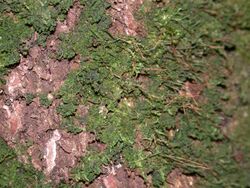Biology:Dendroceros
| Dendroceros | |
|---|---|

| |
| Dendroceros sp. Nees growing on the bark of a tree | |
| Scientific classification | |
| Kingdom: | Plantae |
| Division: | Anthocerotophyta |
| Class: | Anthocerotopsida |
| Order: | Dendrocerotales |
| Family: | Dendrocerotaceae |
| Genus: | Dendroceros Nees in Gottsche, Lindenb. & Nees[1] |
| Type species | |
| Dendroceros crispus (Swartz 1788) Nees 1846
| |
| Species | |
|
See text | |
Dendroceros is a genus of hornworts in the family Dendrocerotaceae.[2] The genus contains about 51 species native to tropical and sub-tropical regions of the world.
Description
The epiphytic and epiphyllous Dendroceros is the only desiccation-tolerant hornwort genus.[3] The gametophyte is yellowish-green and usually less than one-half cm wide. The thallus branches in a bifurcating pattern. In the subgenus Apoceros, there are cavities in the central strand of the thallus. The edges of the thallus are only a single layer of cells thick and have an undulating margin. It is common to find symbiotic colonies of blue-green bacteria (usually Nostoc) growing among the cells. Under a microscope, the epidermal cells have trigones.
The sporophyte is erect when mature, growing up to 5 cm tall. Like other hornworts, its surface has stomata. The interior of the sporophyte differentiates into a central column and a surrounding mass of spores and elater cells, with a distinct spiral. The spores are green and multicellular with an ornamented surface.[4]
Classification
| Cladogram of living Dendroceros[5][6] | |||||||||||||||||||||||||||||||||||||||||||||||||||||||||||||||||||||||||||
|
Current classification by Söderström et al. 2016.[7]
Genus Dendroceros Nees 1846
- D. australis Stephani 1909
- D. crassicostatus Stephani 1917
- D. exalatus Stephani 1909c
- D. gracilis Stephani 1917b
- D. humboldtensis Hürlimann 1960
- D. rarus Stephani 1917b
- D. reticulus Herzog 1950b
- D. subtropicus Wild 1893
- D. tahitensis Ångström 1873
- D. vesconianus Gottsche ex Bescherelle 1898
- D. wattsianus Stephani 1909
- Subgenus (Cichoraceus) Peñaloza-Bojacá & Maciel-Silva 2019
- D. cichoraceus (Montagne 1845) Stephani 1916
- Subgenus (Dendroceros) Nees 1846
- D. acutilobus Stephani 1909
- D. adglutinatus (Hooker & Taylor 1845) Gottsche, Lindenberg & Nees 1846
- D. allionii Stephani 1917
- D. breutelii Nees 1846
- D. crassinervis (Nees 1846) Stephani 1917
- D. crispus (Swartz 1788) Nees 1846
- D. foliicola Hasegawa 1980
- D. herasii Infante 2010
- D. javanicus (Nees 1830) Nees 1846
- D. paivae Garcia, Sérgio & Villarreal 2012
- D. rigidus Stephani 1917
- D. subplanus Stephani 1909
- D. tubercularis Hattori 1944
- D. validus Stephani 1917
- Subgenus (Nodulosus) Peñaloza-Bojacá & Maciel-Silva 2019
- D. africanus Stephani 1917
- D. borbonicus Stephani 1892
- D. crispatus (Hooker 1830) Nees 1917
- D. granulatus Mitten 1871
- D. japonicus Stephani 1909
- Subgenus (Apoceros) Schuster 1987b
- D. cavernosus Hasegawa 1980
- D. cucullatus Stephani 1923
- D. difficilis Stephani 1917
- D. muelleri Stephani 1889
- D. ogeramnangus Piippo 1993
- D. pedunculatus Stephani 1909
- D. seramensis Hasegawa 1986
- D. subdifficilis Hattori 1951
Habitat
Dendroceros grows on humid ground, rocky outcrops, and on the sides of trees. Its name literally means "tree horn".
References
- ↑ Gottsche, C.M.; Lindenberg, J.B.G.; Nees von Esenbeck, C.G. (1846). Synopsis Hepaticarum. p. 579.
- ↑ Renzaglia, Karen S. & Kevin C. Vaughn. (2000) "Anatomy, development and classification of hornworts", pages 1-20 in A. Jonathan Shaw & Bernard Goffinet (Eds.), Bryophyte Biology. (Cambridge: Cambridge University Press). ISBN 0-521-66097-1
- ↑ Hornwort stomata do not respond actively to exogenous and environmental cues
- ↑ Parallel Evolution of Endospory within Hornworts: Nothoceros renzagliensis (Dendrocerotaceae), sp. nov.
- ↑ Peñaloza-Bojacá, Gabriel Felipe; Villarreal-Aguilar, Juan Carlos; Maciel-Silva, Adaíses Simone (2019). "Phylogenetic and morphological infrageneric classification of the genus Dendroceros (Dendrocerotaceae; Anthocerotophyta), with the addition of two new subgenera". Systematics and Biodiversity 17 (7): 712–727. doi:10.1080/14772000.2019.1682080. https://doi.org/10.1080/14772000.2019.1682080.
- ↑ Brinda, John C.; Atwood, John J.. "The Bryophyte Nomenclator". https://www.bryonames.org.
- ↑ Söderström (2016). "World checklist of hornworts and liverworts". PhytoKeys (59): 1–826. doi:10.3897/phytokeys.59.6261. PMID 26929706.
External links
Wikidata ☰ Q1012912 entry
